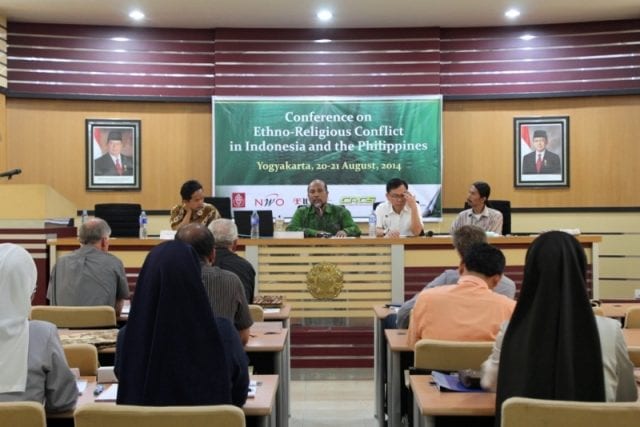Yogyakarta, CPPS UGM – Strengthening religious issues in Indonesia has become increasingly apparent in the last decade. In the past, when the authoritarian New Order regime came to the fore, ethnic issues might have been more prominent than religious issues. However, what is happening now is strengthening the religious groups, especially those that are fundamental.
The radical ISIS movement or the Islamic State of Iraq and Syria, for example, has become more frequent in international report. Many countries, such as the United States, Germany, Iran, Austria, and even Malaysia, have declared that ISIS is a threat. Indonesia also stated the same after the emergence of a video released by ISIS that invited Indonesian Muslims to join their group.
“I see that what really happens in this ISIS issue is the use of religious symbols in political conflicts. The actual conflict is a matter of power. Actions of violence carried out by ISIS, such as killing and mounting, are certainly not in line with religious values. Any religion does not justify murder,” Sukamdi (a researcher at CPPS UGM) said while discussing the issue at Ethno-Religious Conflicts in Indonesia and the Philippines (ERCIP) Program Conference, Thursday (21/8) at Auditorium CPPS, Masri Singarimbun Building.
Sensitivity to religion is often used as a tool. Some are easily affected to join certain radical groups, or even easily triggered to do violence regarding religious elements.
Sukamdi added that supporting activities for ISIS performed in campus couple days ago also showed that today’s education does not have enough influence in overcoming exclusive attitudes. Moreover, the youth with higher education can be easily influenced by sensitive issues, such as religion and ethnicity. Both issues can even make rational people to be irrational.
The same thing was said by Y. Tri Subagya, Ph.D. (cand) from Doctoral Program of Radboud University Nijmegen, Netherland on the same occasion. The results of his dissertation conducted in Ambon and Yogyakarta showed that there is a strengthening of identity towards religious and ethnic groups on the attitudes of the youth, especially students. However, a more prominent identity strengthening in Ambon took place in religious groups.
Tri said that the research he conducted focused on the attitudes or perceptions of individuals towards violence. There was one interesting finding for him. Some previous studies indicated that pluralists can accept differences in other people’s beliefs. Their attitude towards violence tends to be lower. However, this study is not the case.
“My research finding showed that attitudes toward violence are even higher or more positive. People can label themselves as pluralists or may have a pluralist view. However, it does not mean that their attitude is also pluralist, it does not necessarily make people not support violence,” Tri said.
The issue of violence is ultimately not solely supported by religious views. Tri added that what happened is then a conflict of interest. There is evidence showing that the conflicts occur due to competition over the control of natural resources despite the identification of religion which is more visible since it becomes a mobilization tool to encourage the presence of violence.
In addition to the topic of individual attitudes towards violence, the topic of the phenomenon of contact avoidance in Indonesia also became an interesting discussion at the conference which took place in these two days. Cahyo Pamungkas, Ph.D. (cand), who was also involved in the ERCIP research program, said that there was a phenomenon to avoid meeting or contacting people from different groups.
“Contact avoidance can be interpreted to what extent someone accepts or rejects other people of different religions to occupy public positions, or to become neighbors, coworkers, or close friends. So, what is seen is the social distance from one individual to another,” Cahyo explained.
It turned out that the result of a study was also conducted among students in Ambon and Yogyakarta. It showed that many Muslim students in the two cities refused if the public positions such as deputy and mayor were held by Christians. There were 32 percent of Muslim students who did reject it. The rejection also occurede in Christian students even though the percentage is much smaller, that is 7 percent.
“They are relatively more receptive if it is only for friends, neighbors or work colleagues. This finding is indeed different from the research findings conducted in the Netherlands or other European countries. Europeans are more receptive if a public position is held by those of different faiths or ethnicities. However, it is relatively unacceptable to have neighbors,” Cahyo continues. [] Media Center of CPPS UGM
——————————
About ERCIP Program
Ethno-Religious Conflict Program in Indonesia and Philippines (ERCIP) is a research group held under the Nijmegen Institute for Social Cultural Research (NISCO), Radboud University Nijmegen, Netherlands. Starting in 2011, the ERCIP research team conducted conflict studies in two regions; Indonesia and the Philippines. The selected research sampling is students in several universities.
There were two regions that become the research locations in Indonesia; Yogyakarta and Ambon. In Yogyakarta, the respondents were students from Universitas Gadjah Mada, Sunan Kalijaga State Islamic University, and Duta Wacana Christian University. The respondents in Ambon were students from Patimura State University, Ambon State Islamic Institute, and Maluku Christian University of Indonesia. Meanwhile, the research in Philippines was conducted in two regions; Metro Manila and Mindanao. The respondents included students from University of Philippines, Santo Tomas University, Mindanao State University (MSU-IT Iligan), Notre Dame University (Cotabato), and others.
*Info lebih lanjut mengenai program ini silakan klik: Ethno-Religious Conflicts in Indonesia and the Philippines: A Comparative Study

